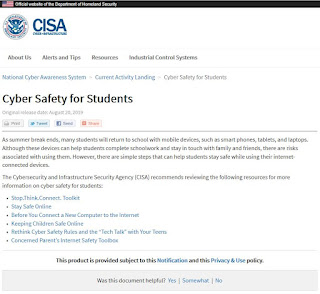 When we hear people talk about "preparedness," we often think of having supplies for that natural disaster, bug-out bags, get-home bags, first-aid supplies, and plenty of water to get by for a few days. In my own case, I'm a CERT Instructor, so it's natural for me to think about preparedness in terms of these types of things, being prepared to provide security for my home or workplace in case of a disaster, and training CERT teams to be ready to deploy on a search and rescue mission. Yeah - I'm "that guy" who carries around first-aid kits, emergency tools, my bug-out (get home) bag, and all sorts of emergency roadside assistance tools everywhere I go. Emergency preparedness in my world is all about not only making sure that I and my family are secure but then being able to help others.
When we hear people talk about "preparedness," we often think of having supplies for that natural disaster, bug-out bags, get-home bags, first-aid supplies, and plenty of water to get by for a few days. In my own case, I'm a CERT Instructor, so it's natural for me to think about preparedness in terms of these types of things, being prepared to provide security for my home or workplace in case of a disaster, and training CERT teams to be ready to deploy on a search and rescue mission. Yeah - I'm "that guy" who carries around first-aid kits, emergency tools, my bug-out (get home) bag, and all sorts of emergency roadside assistance tools everywhere I go. Emergency preparedness in my world is all about not only making sure that I and my family are secure but then being able to help others.
But emergency preparedness is also an important aspect of information security and making sure that our business resources are protected as well. Now would be a great time to review your system security plans and system documentation. Make sure that your contingency plan and business continuity plans are up to date. Update your organizational charts and ensure that all of your emergency contacts, including both internal POCs and your various vendor emergency contacts are up to date.
Updating your telework policies and agreements is also an important aspect of preparedness for the business environment. Telework locations may serve as the alternative work site for employees who are displaced because of damage or complete loss of their primary office space. Make sure that your employees are trained for proper storage and security of work-related documents and information. Ensure that those who are eligible and desire to telework have the proper equipment and an environment at their telework location that is well suited for telework activities.
CISA (US-CERT) released their reminder about emergency preparedness month and has good information about all of the things that I mentioned above, plus some cybersecurity-related issues such as dealing with malware, ransomware, and malicious code, and protecting against identity theft.
Updating your telework policies and agreements is also an important aspect of preparedness for the business environment. Telework locations may serve as the alternative work site for employees who are displaced because of damage or complete loss of their primary office space. Make sure that your employees are trained for proper storage and security of work-related documents and information. Ensure that those who are eligible and desire to telework have the proper equipment and an environment at their telework location that is well suited for telework activities.
CISA (US-CERT) released their reminder about emergency preparedness month and has good information about all of the things that I mentioned above, plus some cybersecurity-related issues such as dealing with malware, ransomware, and malicious code, and protecting against identity theft.
- CISA (US-CERT): September is National Preparedness Month: Be Prepared, Not Scared
- Ready.Gov: Prepared, Not Scared
- Ready.Gov: Cybersecurity
Be sure to visit some of the companies with which I have an affiliate relationship to learn about the emergency preparedness products for us humans that I spoke of before. Great products and a great way to support this blog.
Part of being well prepared for emergency situations at home is having a plan for financial stability. Visit Jay Morrison Academy to find out about entrepreneurship, homeownership, credit repair, wealth building, and financial education!












